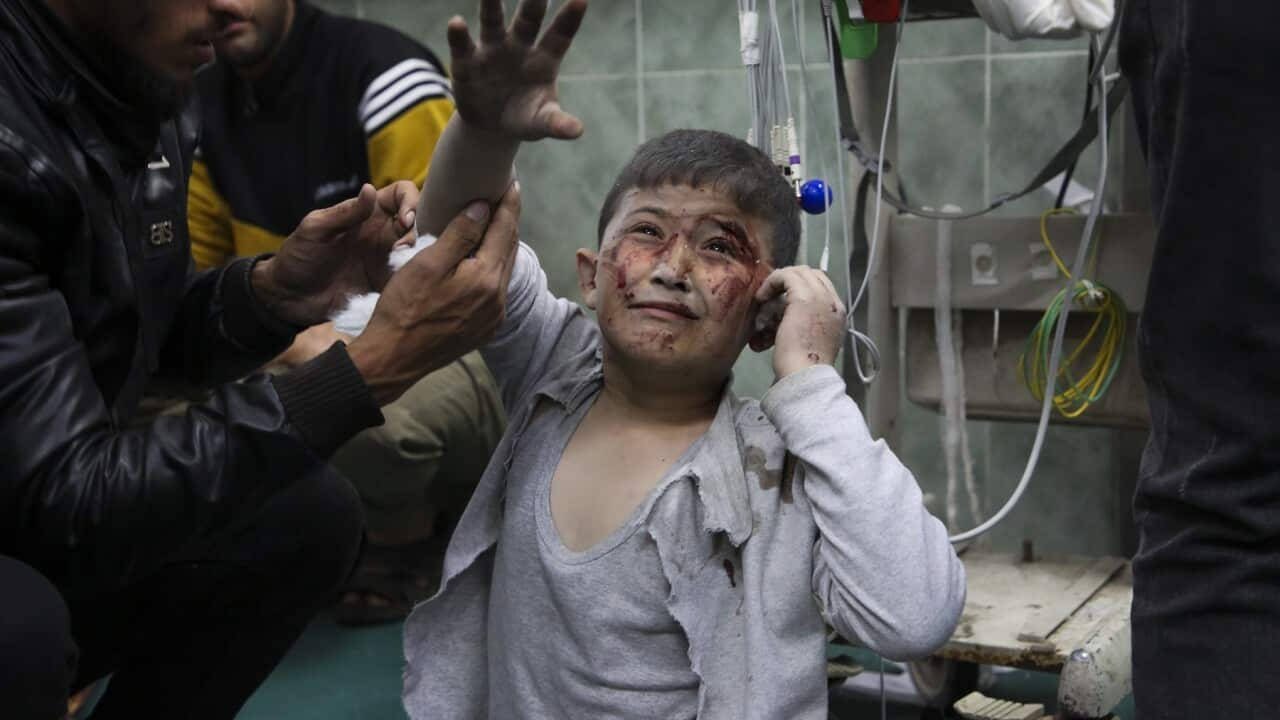TRANSCRIPT
In the southern Gaza city of Rafah, residents search the wreckage of a house for people missing under rubble.
Health officials say at least 7 people, including 3 children, have been killed after an Israeli airstrike hit the house overnight.
This man, who fled the city of Khan Younis for the relative safety of Rafah, says he was lucky to survive.
“The Israeli army ordered us to move to Rafah because it is a safe area. So, we moved to Rafah, and this is what happened. The Israeli planes hit the neighbours’ house and the house where we were staying was damaged and we almost died in it. This is what they call security and safety.”
The deaths contribute to a toll which Gaza's Health Ministry says has exceeded 32,000, since October the 7th, with more than 74,500 wounded in Israeli offensives since.
For the more than half of Gaza's population — an estimated 1.5 million people - sheltering around Rafah, there are fears that number could grow significantly.
Israeli Prime Minister Benjamin Netanyahu has vowed to continue alone with a ground offensive on the city even if closest ally United States opposes the plans.
Vice President Kamala Harris is the latest in a line of U-S politicians to warn Israel a military operation in Rafah would be a "huge mistake".
“Let me tell you something. I have studied the maps. There's nowhere for those folks to go. And we're looking at about a million and a half people in Rafah who are there because they were told to go there, most of them. And so we've been very clear that it would be a mistake to move into Rafah with any type of military operation.”
The Vice President would not comment on potential consequences if Israel's assault goes ahead, but allies including the U-K and Canada have discussed embargoes on arms sales to the country.
But, in a sign of the US' increasingly awkward position on Israel, the U-S Congress approved additional military support worth $5.8 billion last week.
On the same day, US diplomats were seething after Russia and China vetoed a US-sponsored United Nations resolution supporting “an immediate and sustained cease-fire” in Gaza, only a month after the US vetoed a similar resolution.
Amid the strain the conflict has put on US-Israeli relations, Israeli Defence Minister Yoav Gallant is heading to Washington.
He says his trip will serve a “common need" to defeat Hamas.
“It is primarily focused on preserving the military advantage of the State of Israel, and its ability to obtain air defence systems and munitions, but no less than that, on relations with the United States and the common need to achieve the goals in Gaza, to defeat the Hamas organization, to return the hostages, and to establish what we need for Israel's security.”
The visit also comes as major cracks are starting to show in Mr Netanyahu's coalition government.
Both Mr Gallant and fellow war cabinet minister Benny Gantz have said they do not support a bill that will pass into law a historic exemption for ultra-Orthodox Jews from military service.
The popular former prime minister Gantz has threatened to resign from the Israel's three-person emergency cabinet if the bill succeeds.
Secular Israelis have protested the policy, while thousands have again taken to the streets of Tel Aviv calling for a ceasefire deal to bring back Israeli hostages held in Gaza by Hamas.
This man was among many protesters holding the Prime Minister directly responsible.
“Our prime minister, I suspect very strongly that he doesn't want this deal to happen, because the most important thing for him is to keep his seat and his coalition rather than to release the kidnapped people. He doesn't give enough space to the negotiation team to reach an agreement.”
This was in stark contrast to the reception received by US Secretary of State Antony Blinken, when he met with relatives of the more than 130 hostages who remain in Gaza, including at least 33 believed to have died.
Mr Blinken, on his sixth diplomatic visit to the region since October the 7th, was praised for coming out to meet family members, with Tel Aviv crowds chanting "We trust you Blinken" and "Set them free".
But elsewhere, the U-S has been accused of a "moral failure", after Congress also voted to ban funding for the UN refugee agency for Palestinians, UNRWA.
The agency itself confirmed Israel says it will no longer approve UNRWA food convoys to north Gaza, where 70 per cent of people face the highest level of food scarcity.
UN Secretary-General Antonio Guterres has said UNRWA responded effectively to Israeli allegations staff members had collaborated with Hamas.
Speaking from the Egyptian border, he has described lines of blocked aid trucks to a country where 100 per cent of the population is facing food insecurity as a"moral outrage".
“Palestinians in Gaza desperately need what has been promised, a flood of aid, not trickles, not drops. Some progress has been made but much more needs to be done. Making that happen takes very practical steps. It requires Israel removing the remaining obstacles and choke points to relief. It requires more crossings and access points. All alternative routes are of course welcome. But the only efficient and effective way to move heavy goods is by road.”













